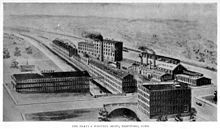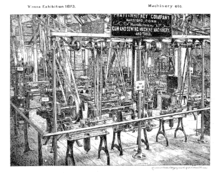Pratt & Whitney Measurement Systems
 | |
| Industry | Machine tools, machinery, metrology systems |
|---|---|
| Predecessor | Pratt & Whitney Company |
| Founded | 1860 |
| Headquarters | Originally Hartford, Connecticut; now Bloomfield, Connecticut |
Key people | Francis A. Pratt, Amos Whitney |
| Products | Instruments and systems |
| Website | www |
Pratt & Whitney Measurement Systems is an American multinational corporation that specializes in producing high-precision measuring instruments and systems.
History
[edit]

The Pratt & Whitney Company was founded in 1860 by Francis A. Pratt and Amos Whitney, with headquarters in Hartford, Connecticut. The company manufactured machine tools, tools for the makers of sewing machines, and gun-making machinery for use by the Union Army during the American Civil War.[2][3]
In 1925, Frederick Rentschler approached Pratt & Whitney for funding and a location to build his new aircraft engine.[4] Pratt & Whitney loaned him $250,000, the use of the Pratt & Whitney name, and space in their building. This was the beginning of the Pratt & Whitney Aircraft Company, which evolved into today's widely known aircraft engine manufacturer.
In 1929, Rentschler ended his association with Pratt & Whitney Machine Tool and formed United Aircraft and Transport Corporation, the predecessor to United Technologies Corporation. His agreement allowed him to carry the name with him to his new corporation.
For many years, the company maintained a plant on New Park Avenue near the Hartford/West Hartford border, where they manufactured machine tools such as their jig-bore machines and other numerically controlled machines. They also manufactured engine lathes, milling machines and twist drills. The company is currently located in Bloomfield, Connecticut.
Main product lines include universal comparators, bench micrometers, and inspection gaging systems. These instruments primarily use laser interferometers, encoders and LVDTs, and are primarily used in quality departments, calibration laboratories, and in manufacturing environments.
References
[edit]- ^ Arnold, Horace L. "Modern Machine-Shop Economics. Part II" in Engineering Magazine 11. 1896
- ^ Francis Pratt, Britannica.com
- ^ Amos Whitney, Britannica.com
- ^ Engineering Success: Pratt & Whitney Aircraft, Bayla Singer
Further reading
[edit]- Gunston, Bill (1999). The Development of Piston Aero Engines, 2nd Edition. Sparkford, Somerset, England, UK: Patrick Stephens, Haynes Publishing. ISBN 978-0-7509-4478-6.
- Gunston, Bill (2006). World Encyclopedia of Aero Engines, 5th Edition. Phoenix Mill, Gloucestershire, England, UK: Sutton Publishing Limited. ISBN 978-0-7509-4479-3.
- Pratt & Whitney Company (1930). Accuracy for Seventy Years: 1860-1930. Hartford, Connecticut, USA: Pratt & Whitney Company. ISBN 978-1-55918-087-0. LCCN 30029477.
- Roe, Joseph Wickham (1916), English and American Tool Builders, New Haven, Connecticut: Yale University Press, LCCN 16011753. Reprinted by McGraw-Hill, New York and London, 1926 (LCCN 27-24075); and by Lindsay Publications, Inc., Bradley, Illinois (ISBN 978-0-917914-73-7). Chapter XIV, pp 173-185.
- Thurston, Robert Henry, ed. (1876). "Reports of the Commissioners of the United States to the International Exhibition Held at Vienna, 1873. Published under direction of the Secretary of State by authority of Congress. Volume III: Engineering". Washington, DC, USA: U.S. Government Printing Office. pp. 220–232 (pdf 283–297).
